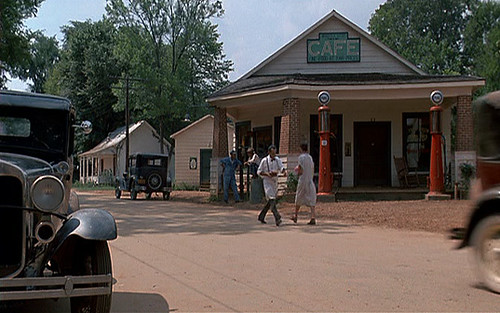
Rediscovering the Past to Understand the Present
At the heart of Fried Green Tomatoes lies a quiet yet powerful message: sometimes, the most important truths about ourselves are hidden in stories of the past. The film delicately intertwines two timelines—one set in the 1920s and 1930s, the other in the late 1980s—creating a rich tapestry of memories, identity, and transformation.
Evelyn Couch, played brilliantly by Kathy Bates, is a woman adrift in middle age, struggling with loneliness, body image, and a marriage that has lost its warmth. Her chance meeting with Ninny Threadgoode (Jessica Tandy) in a nursing home sparks something that no therapist or self-help book ever could. Ninny’s stories of the bold and rebellious Idgie Threadgoode and her deep bond with the gentle Ruth Jamison offer Evelyn not only a window into a lost world—but a mirror into her own unrealized potential.
Identity Woven Through Generations of Women
The characters in Fried Green Tomatoes aren’t just women—they are symbols of survival, resilience, and quiet revolution. Idgie’s fierce independence and refusal to conform to societal norms stand in contrast to Ruth’s initial fragility, shaped by domestic abuse and the confines of traditional femininity. But as their friendship blossoms, Ruth becomes stronger, while Idgie’s rough edges soften. Together, they build not only the Whistle Stop Café, but a sanctuary for outsiders, outcasts, and anyone who needs a second chance.
These characters’ evolution echoes through time. Evelyn finds her courage because Idgie and Ruth dared to live on their own terms. The café, once a physical space, becomes something metaphysical: a place where healing, community, and unapologetic selfhood take root.
Whistle Stop Café as Sacred Ground
On the surface, the Whistle Stop Café is just a small Southern eatery. But for the characters—and viewers—it becomes much more. It’s where secrets are kept and shared, where lives are rebuilt, and where justice is served, both literally and figuratively. Whether feeding the hungry during the Depression or protecting Ruth’s son from an abusive father, the café is the physical embodiment of moral courage.
Its spirit lives on long after it closes, carried in the stories Ninny tells and in the choices Evelyn begins to make. The café is memory. The café is defiance. The café is hope.

A Timeless Message for Today’s World
More than three decades after its release, Fried Green Tomatoes still resonates deeply. In today’s age of disconnection, the film reminds us of the importance of deep female friendships, of standing up for what’s right, and of rewriting our own narratives when the world tries to confine us.
Whether you’re watching for the first time or the fiftieth, the film whispers to you: you are more powerful than you believe, and it is never too late to change.
